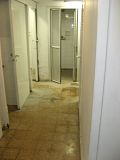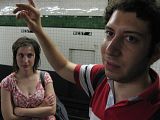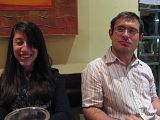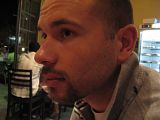I didn’t get Lucky Charms cereal growing up – too many marshmallows. This made me a day-to-day Cheerios man, with a side of Rice Krispies and Kix, and the occasional and much sought-after Honey Nut Cheerios, my personal favorite. No Count Chocula, BooBerries, Cap’n Crunch, Frosted Flakes, and most certainly, no Lucky Charms. How was I supposed to learn about diversity growing up, if not from my breakfast cereal? While I stared into bowls of ubiquitous uniformity every day, kids across the US (and wherever else General Mills has spread) were learning that yellow stars could live in harmony with green shamrocks, and just because there were more frosted cereal bits than all of the different kinds of marshmallows put together, there was an understanding that every piece was special in its own right, for its own reason. Sure, some Krispies were saying “Snap” while others “Pop,” but differences in dialect is hardly a basis for an upbringing focused on diversity. Cheerios, indeed.
So, I’ve arrived and settled in Haifa after doing a sherut (shared-taxi) double-switch (at the airport), managing to get picked up and dropped off door-to-door for less than it would have taken to go taxi-bus-taxi from Jerusalem direct to Haifa. I’ll best these Israeli systems yet.
Speaking of the sherut, it’s a fascinating thing. In Jerusalem, the only sherutim are available to take you to and from the airport. In Haifa, sherutim drive along the bus routes, picking up passengers who would rather ride in a smaller, more comfortable vehicle than the crowded, hot bus. FOR LESS MONEY. Now, yes, if you have a monthly or multi-ride pass, the bus does work out cheaper, but for base, ride-to-ride pricing, the sherut can’t be beat. So if you come to Haifa, look out for the yellow, red, and white mini-buses.
The dorms here are simply beautiful. From what all of my visitors have said, we certainly seem to have the best of it; I’ve posted some pictures from our living room and upstairs windows. There are six of us here, each with our own rooms and bedrooms, set up like a small, double-story apartment. Four of my roommates are 19, having just finished their freshmen years of college, and the other only showed up yesterday, and I’ve shared five words with him, so I really couldn’t tell you how old he is. Regardless, I feel old. I’m definitely the old man of the apartment. Luckily, Andrew, a Dartmouther (or a Dartdentist?), and I both have an interest in making the gym a regular part of our weekly regimen, so we’ve worked out a daily schedule that we’ll stick with each others’ help. The hardest part about going to the gym is motivation, so hopefully he’ll be a major kick in the pants in helping me get in shape, finally.
Also, I’ve met two other future Pardesniks, both named Joshua, oddly. We all spent a good bit of this last Shabbos together, trying to make something out of nothing (having only arrived Thursday, Shabbat plans were a bit hectic, as you might imagine), finding a small Shomer Shabbos community here with which to have lunch, prayer, and definitely great conversation. We’re also trying to set up a thrice-weekly minyan here, which will definitely be new to me, praying three mornings a week (especially at 7 am!). Joshua (since I don’t know their last names, and don’t have pictures for you, I’ll let you just assume which one I’m talking about) helped me lay tefillin yesterday for the first time, which was pretty special. He’s also going to be a big help in my getting to shul three times a week, getting myself out of bed instead of sleeping in, which I tend to prefer, historically.
So, I’m starting proper ulpan classes tomorrow morning, Andrew and I will be going to the gym, and I’ll be starting to daven more frequently. In coming to Israel, these were definitely three of my end-goals: speak passable Hebrew, establish an exercise regiment, and pray more regularly. And now, within two weeks of being in Israel, I’m starting on all three. Alas, I’m now faced with an intellectual impasse: if one lives by the motto, “No day like today to get started,” does one also have to concern oneself with burning out too quickly, overdoing it at first and ending up back where one started, or worse? I’m certainly worried about failure – I’m afraid that my Hebrew won’t improve enough, that I’ll somehow fall way behind my class, that my brain won’t ever switch over, and that I’ll be living out of a dictionary all year. I’m afraid that I’ll work out for a week, then take a couple days off, then a few, and then, like so many times before, end up wasting lazy time away, talking about how I just “don’t agree with exercise.” Mostly, though, I’m afraid davening won’t get any easier, that I’ll fail to find meaning in everyday prayer, that I’ll start to tie my frustration with davening to some overall frustration with Judaism, and I’ll end up resenting my own faith.
Now, do I think these things will happen? Overall, no. I think my Hebrew will improve, for sure, and I’m so ready to start learning, so eager to establish proficiency, that I know I’ll learn a ton, and I’m already thinking about doing weeknight ulpan during the school year, so I’ll have even more room for improvement as time goes on. Working out worries me a bit more, but Andrew is pretty dedicated, and with the routine schedule of our daily life here, I think we’ll be able to maintain a solid routine. Prayer, though, probably worries me more than anything.
So far, my “Jewish discovery” has been one of culture, law, and custom; I’ve always had a difficult time with prayer, so I’ve focused more on learning about how religious Judaism functions socially and customarily, using daily Jewish law and custom to integrate myself into a stronger Jewish identity and to work towards becoming a more giving, more caring person than I once felt I was. Prayer vexes me, though. I appreciate the obligation of prayer; I mean, I identify with fulfilling the mitzvot of prayer, maintaining a crucial part of the covenant made with Hashem at Sinai, stepping into a daily ritual of practice maintained over 2000 years, since the destruction of the second Temple. But where does it get me, really, besides out of bed at 7 am? Do I really feel a connection to Hashem when I lay tefillin and daven Shachrit, do I feel tied to my Jewish people, or do I, more appropriately, feel like a self-ostracized Jew in a basement synagogue, praying about things I can’t really identify with at an hour when all of my peers are asleep? If the latter is true, the question remains, why do it at all? Where is the meaning?
Until now, my Jewish path has been laid with a golden sheen of newness, discovery, gratification, and allure; I’ve really wanted to take on all of the practices that I’ve adopted, mostly because they had such a real, visceral effect on my demeanor and attitude, and, for different reasons each, gave new light and meaning to my life and drew me closer to my identity as part of the Jewish community as a whole. Prayer, though, is a difficult thing; in the Amidah, the standing prayer, you separate yourself from the community and try to establish communication with the divine, praying loudly enough that you (and supposedly Hashem) can hear, but not so loudly so as anyone else can understand your prayer. You’re alone with your thoughts and prayer, no longer even joining in the community of the rest of the prayer service, but creating a relationship with the divine, asking for peace and prosperity not with the community, but instead, for the community. Alone.
So, this really raises a question of, yes, faith. Part of why praying is challenging lies in the fact that my Hebrew is terrible, so while men so familiar with the service that they’ve written to memory nearly the entirety of the prayer, I struggle to even follow when others read aloud, not to mention reading passages aloud myself so as not to bring the service to a screeching halt. Also, and maybe more pertinent, I just don’t know how to communicate with the divine in this way; I relish seeing Hashem work so beautifully in day-to-day life, in the way people interact, in the curious structure of life humanity has created, but when faced with the whole responsibility of divine contact, I’m not even sure where to begin. Until now, Judaism has been a blessed path of wonder; now, I’m faced with a part of practice that, frankly, I just don’t want to do. But, I’m going to do it. I’ve taken on this much, and in everything I’ve found meaning; now comes the point where I need to find the faith to do a little more, to accept, with good faith, that several millennia of practice have yielded a custom rich with meaning on every front.
So, for now, prayer wakes me up at 7 am, when I’d otherwise be sleeping. Prayer is getting me to bed a little bit earlier. Prayer is putting me a on a regular schedule, when I might otherwise be staying up late and waking up groggy. So, for now, this is what prayer is. While I hope that prayer will become more spiritual, more meaningful as my skills and knowledge development, for now, prayer gets me out of bed in the morning, and for now, that’s enough.
Here are some pictures of Jerusalem, taken from an amazing overlook, followed by some shots from my apartment/dorm in Haifa.
As always, your comments are more than welcome, both on here or via e-mail.
I’d love to hear from all of you, and I miss you dearly.
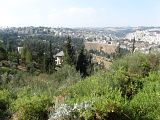
Looking down on the Old City in Yerushalaim.

More Old City.
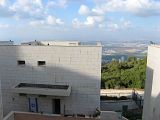
View from my dorm's window, downstairs.

View from my dorm's window, upstairs.

